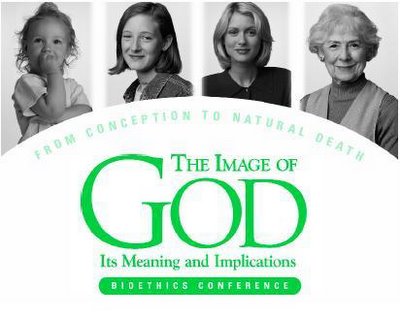
NFP violates a grammatico-historical exegesis of 1 Corinthians 7:5, which reads:
Do not deprive one another except with consent for a time, that you may give yourselves to fasting and prayer; and come together again so that Satan does not tempt you because of your lack of self-control.Let's look at the Greek: me (do not) apostereite (refuse; this word can commonly also mean: rob, steal, defraud) allelous (each other) ei meti (unless) an ek sumphonou (by mutual consent; lit. out of the source of mutual consent) pros kairon (for a brief time {'brief' is not literal, but is most certainly implied by the pairing of these words, even kairon itself though translated 'time' was viewed as an occasion rather than an extent}) hina sxolasete tei proseuxei (in order that you may devote yourselves to prayer) kai palin epi to auto ete (and that you may again be together {this is the word order for the proper emphasis, hina (in order that) should be carried twice: originally and again with kai}) hina me peiraxei humas ho satanas (in order that Satan may not tempt {commonly test} you) (by means of; also during) diaten akrasian humon (your self-indulgence {sometimes lack of self control}).
Now, let's ask some exegetical questions:
Question: Does the "ei meti" extend all the way through to the "hina sxolasete tei proseuxei" or is this left to personal interpretation? In other words, must all three conditions be met, as in: "unless by mutual consent" and "unless for a brief time" and "unless in order that you may devote yourselves to prayer?" Or are the second two conditions optional, as in: "unless by mutual consent" and "for example, for a brief time," and "for example, that you may devote yourselves to prayer?"
Answer: The "ei meti" (unless) extends through all three conditions because if they were separate thoughts from the unless they would have been separate statements, and also because the word "hina," is specifically used to refer back to the "ei meti" (unless).
Simply put, Paul’s Greek wording states that all three conditions must be met to allow abstinence: 1) mutual consent, 2) brief time period, and 3) for prayer.
Question: Is fasting also implied in "hina sxolasete tei proseuxei." Some manuscripts read "prayer and fasting."
Answer: Some Greek texts do include the word for fasting "nesteiai" in this verse as "tei nesteiai kai tei proseuxi" (for fasting and prayer). The explanation for this discrepancy is simple to explain. Prayer ("proseuxei") in Greek meant literally "devoted communication to the Lord." It referred to a state of mind rather than a specific act. Certain Jewish sects took for granted that fasting was a mandatory condition for the proper state of mind of prayer. In such a case, both went hand in hand. If the scribe who copied the text was of such a sect, he would have been obliged by the ultra-specific literal convention of the time to add the word for fasting. Roman influence on the Greek language of the time required ultra-specificity. So, fasting is not necessarily implied, unless you believe that fasting is required for proper prayer to occur. It seems logical to assume that the original manuscript of 1 Cor. likely only stated prayer.
Question: What about the meaning of "pros kairon" (for a brief time)? Could this brief time be repeated on a monthly basis?
Answer: Kairon definitely means a "brief" time. Exactly how long is meant by "brief" is not stated, but it is obviously supposed to be a time which is brief enough that the couple come together again in order to avoid temptation from Satan. However, in any case, it must come to a definable conclusion. With the words "pros kairon," typically the goal must be achieved at the end of the period of time. A conclusion must be reached, like the harvest at the end of the "season." Thus, sequential repetition on a monthly basis is not allowed in Paul’s choice of words.
Abstinence must be temporary and not repetitive, and it must be mutually agree to. But, most importantly, abstinence is only allowed for the exclusive purpose of prayer, not the prevention of pregnancy.
Augustine also had an opinion on "Natural" family planning:
Two books composed in the first year after his baptism as a Catholic Christian proclaim the reaction [of St. Augustine to birth control]. They are The Morals of the Manichees and The Morals of the Catholic Church. They were written, Augustine states specifically, to refute the Manichean claims of continence. In The Morals of the Manichees, Augustine declares that the Manichees are opposed to marriage. They are opposed to marriage, because they are opposed to procreation which is the purpose of marriage. They permit marriage, it is true, to their Auditors, the multitude of followers or catechumens who are not held to the standards of the Elect. These marriages of Auditors, however, the Manichees attempt to deprive of substance, for they advise the Auditors to avoid procreation. Augustine recalls the advice given and evaluates its significance in a passage which turns into a major attack on contraception:
Is it not you who used to warn us to watch as much as we could the time after purification of the menses when a woman is likely to conceive, and at that time refrain from intercourse, lest a soul be implicated in the flesh? From this it follows that you consider marriage is not to procreate children, but to satiate lust. Marriage, as the marriage tablets themselves proclaim, joins male and female for the procreation of children. Whoever says that to procreate children is a worse sin than to copulate thereby prohibits marriage; and he makes the woman no more a wife but a harlot, who, when she has been given certain gifts, is joined to man to satisfy his lust. If there is a wife there is matrimony. But there is no matrimony where motherhood is prevented; for then there is no wife. (The Morals of the Manichees 18.65 PL 32:1373)The method of contraception practiced by these Manichees whom Augustine knew is the use of the sterile period as determined by Greek medicine. The Manichees, despite their keen interest in avoiding procreation, had acquired no better information. Probably they explained the disappointments which this advice must have entailed as due to some failure to watch the period closely.
In the history of the thought of theologians on contraception, it is, no doubt, piquant that the first pronouncement on contraception by the most influential theologian teaching on such matters should be such a vigorous attack on the one method of avoiding procreation accepted by twentieth-century Catholic theologians as morally lawful.
Contraception: A History of Its Treatment by the Catholic Theologians and Canonists, by John T. Noonan, Jr., Belknap Press of Harvard University Press, Cambridge, Massachusetts, 1966


















